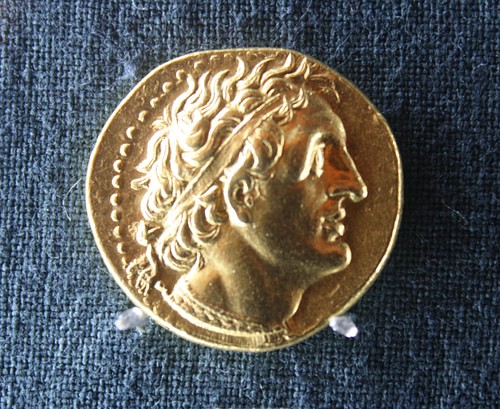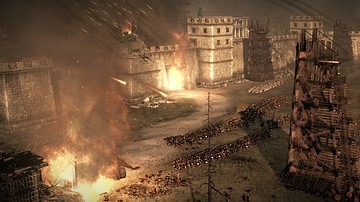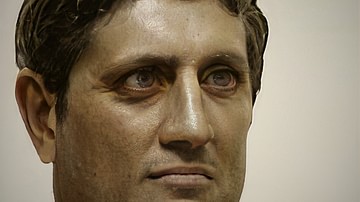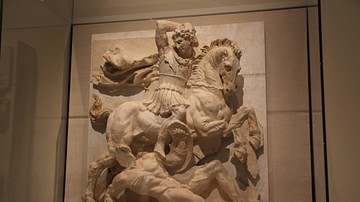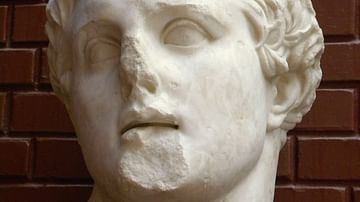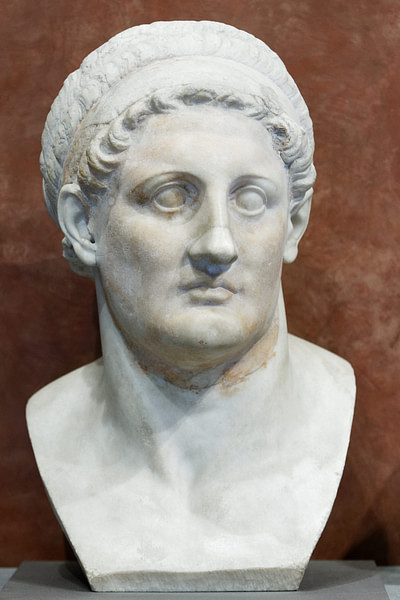
Ptolemy I Soter (366-282 BCE) was one of the successor kings to the empire of Alexander the Great. He served not only as king of Egypt but also the founder of the Ptolemaic Dynasty, a dynasty which included the infamous Cleopatra VII.
Early Life & Persian Campaign
Ptolemy was a Macedonian nobleman, son of Lagos. Rumors circulated, however, that he was actually the illegitimate son of Alexander's father Phillip II, a possibility that would have made him Alexander's half-brother. Although older than Alexander and many of the other generals who followed Alexander into Persia, he still became a close friend, advisor and later one of his seven personal bodyguards. Following Phillips II's death at the hands of Pausanias, Alexander embarked on his quest to meet, defeat and conquer Darius III and the Persian Empire. Although historians are in disagreement concerning Ptolemy's role in the Persian campaign, they do agree that he did participate in a number of battles. This disagreement stems from the fact that Ptolemy was also a historian of sorts and his biography of Alexander may have exaggerated his own contributions.
Ptolemy's name first appears during Alexander's defeat of Memnon, the Greek mercenary general in the service of Persia, at Halicarnassus. Supposedly, Alexander left Ptolemy with a force of 3000 men to finish subjugating the city while he moved on to Gordium. Ptolemy next appears at the battles of Issus and Gaugamela. At Issus he served in the left flank under the command of Parmenio. Next, when the Persian king Darius III was found dying after his defeat at Gaugamela and his assassin Bessus had been identified, it was Ptolemy who was sent to collect the assassin. He brought him to Alexander naked, in chains, and wearing a dog collar.
In Persepolis, Ptolemy was linked to the burning of the city. At one of Alexander's celebrations, Ptolemy's mistress Thais suggested the palace should be burned. In his World History Diodorus made mention of this incident:
When the Companions were feasting, and intoxication was growing [...] a violent madness took hold of these drunken men. One of the women (Thasis) declared that it would be Alexander's greatest achievement in Asia to join in their procession and set fire to the royal palace. [...] Others joined in the cry and said that only Alexander was worthy of this deed [... and] a quantity of torches was quickly collected. [...] The king led them to the revel, with Thais the courtesan conducting the ceremony. She was the first after the king to throw her blazing torch into the palace.
Egypt & India
Although his role is unclear, most historical accounts are in agreement that Ptolemy was with Alexander in both Egypt and India. He was in Egypt in 332 BC at Siwa and Memphis, but the History of Alexander has him playing a vital role in a number of conflicts in India while others have him as only a minor if not insignificant participant. One story which may or may not be true has Ptolemy's life being saved during the campaign into India. After Ptolemy was struck by a poisoned arrow, it was Alexander who saved his life by using various native herbs to extract the poison. It was during this time, after a failed conspiracy to kill Alexander was discovered, that Ptolemy was named one of the king's personal bodyguards.
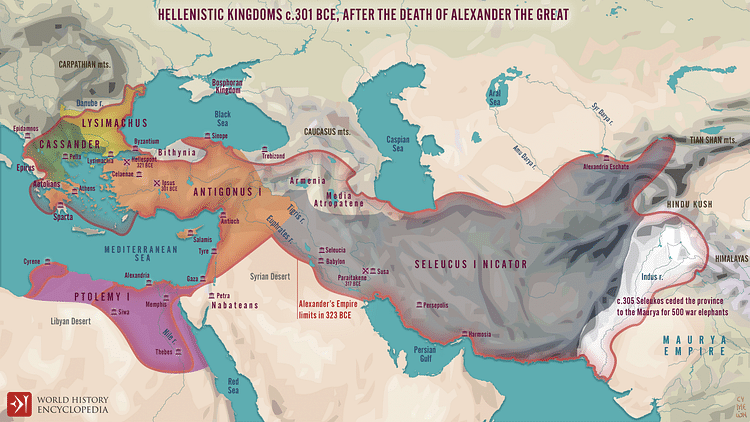
Wars of the Diadochi
When Alexander died in 323 BC, the fate of the empire was left in the hands of Perdiccas, the cavalry leader, who had been handed Alexander's signet ring on the king's deathbed, a possible transference of power. Wanting to keep the empire intact, Perdiccas suggested everyone wait with naming a successor until after the birth of Alexander and Roxanne's child (the future Alexander IV). Ptolemy was completely against this idea and led a campaign to divide the empire among the leading generals. He got his wish and received in the division his first choice – Egypt. The alliances that would be formed among these new satraps were tenuous and both war and peace would reign for 30 years. These battles became known as the Diadochi or Successor Wars.
The one common thread among these “kings” was that no one liked Perdiccas, and Perdiccas disliked Ptolemy above all. It was obvious that these two men would never agree, and this was even more evident when Ptolemy stole Alexander's remains: Perdiccas sent Alexander's body to a newly constructed tomb in Macedonia, but Ptolemy hijacked the body when it arrived in Damascus. Diodorus's history recorded this theft:
Ptolemy, moreover, doing honour to Alexander, went to meet it with an army as far as Syria and, receiving the body, deemed it worthy of the greatest consideration. He decided for the present not to send it to Ammon, but to entomb it in the city that had been founded by Alexander himself… There he prepared a precinct worthy of the glory of Alexander in size and construction.
Perdiccas resented this theft and immediately took action, attacking Egypt. This attack, however, would be his downfall; he led his troops on three separate missions into Egypt, failing each time to cross the Nile. With this failure and a loss of 2000 soldiers, his men revolted and executed him.
Unlike the other generals, Ptolemy's major concern and ambition did not go far beyond the borders of Egypt. While he became involved in the infighting among the others and eventually acquired lands in the eastern Mediterranean, his major concern was Egypt. When Antigonus I invaded Babylon, Seleucus I Nicator sought asylum in Egypt with Ptolemy, but after Ptolemy's defeat of Antigonus' son Demetrius I of Macedon at Gaza, Seleucus was able to return to Babylon. Following a brief peace, Ptolemy was involved in a series of conflicts with both Antigonus and Demetrius, finally aiding in their defeat and Antigonus' death at Ipsus in 301 BC. By then Ptolemy had assumed the title of king as well as being named Soter meaning “savior” for his defense of Rhodes against Demetrius.
Ptolemaic Dynasty
During Ptolemy's rule of Egypt, he put the country on a sound economic and administrative footing. Since he did not want to fall under the influence of the priests and officials at Memphis, Ptolemy's first decision was to move the country's capital to Alexandria. Since it was on the Mediterranean Sea, it was strategically better, providing easier access to both the sea and his homeland of Greece. Because of this move, Alexandria became more of a Greek rather than Egyptian city. Greek became the language of both government and commerce. Amazingly, the only member of the Ptolemaic Dynasty to ever learn Egyptian was Cleopatra VII.
While he gave respect to the Egyptian priests and even rebuilt temples destroyed by the Persians, he believed he needed another way to connect with the Egyptian people. One of his first actions was to establish a cult of Alexander; of course, by doing this, he established himself as a legitimate heir. Alexander became a “state god” and his “priest” the highest clerical position in Egypt. Next, he created a new religion with a new god Serapis, the god of healing. This new religion was a combination of both Greek and Egyptian influences, although the Egyptians saw it as more Greek than Egyptian. It never achieved much success, and government funding was eventually withdrawn.
Ptolemy made Alexandria the intellectual center of the Mediterranean when he built a massive library and museum there. The museum contained a covered arcade, seating for quiet contemplation as well as a dining hall. The library contained thousands of papyrus scrolls and attracted men of literature and science from all over the Mediterranean area for years to come, Euclid and Archimedes being two of the more notable. It became the center of Hellenistic culture. Ptolemy began the construction of the Pharos, a lighthouse (to be completed by his son Ptolemy II). The Lighthouse of Alexandria was a massive structure of three stories with a statue of Zeus atop. A beacon was visible for miles and was lit day and night. It became one of the Seven Wonders of the ancient world. After Ptolemy died in 282 BC, his descendants would rule Egypt for almost 300 years until it was conquered by Julius Caesar and the Romans. After his death, Ptolemy was deified and a festival was held in his honor for years to come.
